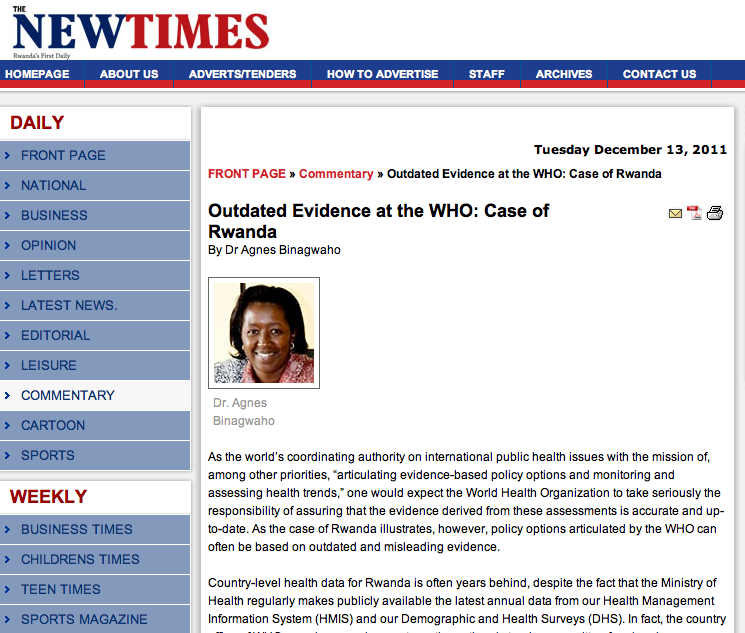A login on Twitter is one of my morning routines – you never know if a tweet may influence the agenda of your day and today I thought I’d share a small Twitter moment with you. This morning I came across a tweet that triggered my Health Information System past and former WHO/Health Metrics Network employer status. The tweet was the below:

In his tweet, Matthew Greenall, an advisor on AIDS & sexual health programmes in low-income countries, links to an article published in the Rwanda paper The New Times. The article, authored by Dr Agnes Binagwaho, Rwandan Minister of Health directs a well-argued critic against the up-to-dateness of WHO country specific health data.
Finding the article very interesting I emailed it to a group of former WHO/HMN colleagues (none of them are on Twitter so I couldn’t tweet it to them). In sending it, I did not really reflect on the possibility that those of my colleagues still within WHO could do anything about it. I just felt like sharing it with them. One of my former colleagues, who is actually involved in health statistics from WHO, read it and responded back quickly thanking me for pointing it out, and said that she had forwarded it up the system to the people who actually are responsible for the World Health statistics and Global Health Observatory. She hoped that a dialogue could be started. I assume she primarily refered to a dialogue with Rwanda, but most definitely also a dialogue within WHO on the measures the organisation has to make sure their data evidence is up to date (which seems to be complicated by WHO itself).
I hope, however, that the dialogue could also be on WHO communication strategies and presence on social media, for example to role of Twitter in communicating and keeping up to date on current trends and affairs – not just through one official WHO account, but also through personal or much more issue specific WHO areas.

The article by the Rwandan Minister of Health was published in what I assume to be a rather low-impact media channel (how many of you knew of Rwandan The New Times?). Although the story could be picked up by other media and passed on, I am not sure how quickly the story would reach WHO. Of course the WHO country office in Rwanda could pick up on the article and pass it on, but I would be surprised if they have not already been contacted by the Rwandan Minister of Health in relation to the outdated WHO data. It seems however in this particular case that the story travelled the fastest through Twitter, and through Twitter came to the knowledge of the right people and not just WHO communication officers (I wonder if it did?).
Although I find the critic of WHO’s data interesting it is not so much the specific story that interests me. Whether or not this particular critic will result in changes, dialogue or changed communication priorities, it was for me once again an interesting and educational Twitter experience. It was great to see how something I picked up on Twitter was passed on and landed in the hands of the people who need to know the content of the article. There really is something to that Twitter invention….


